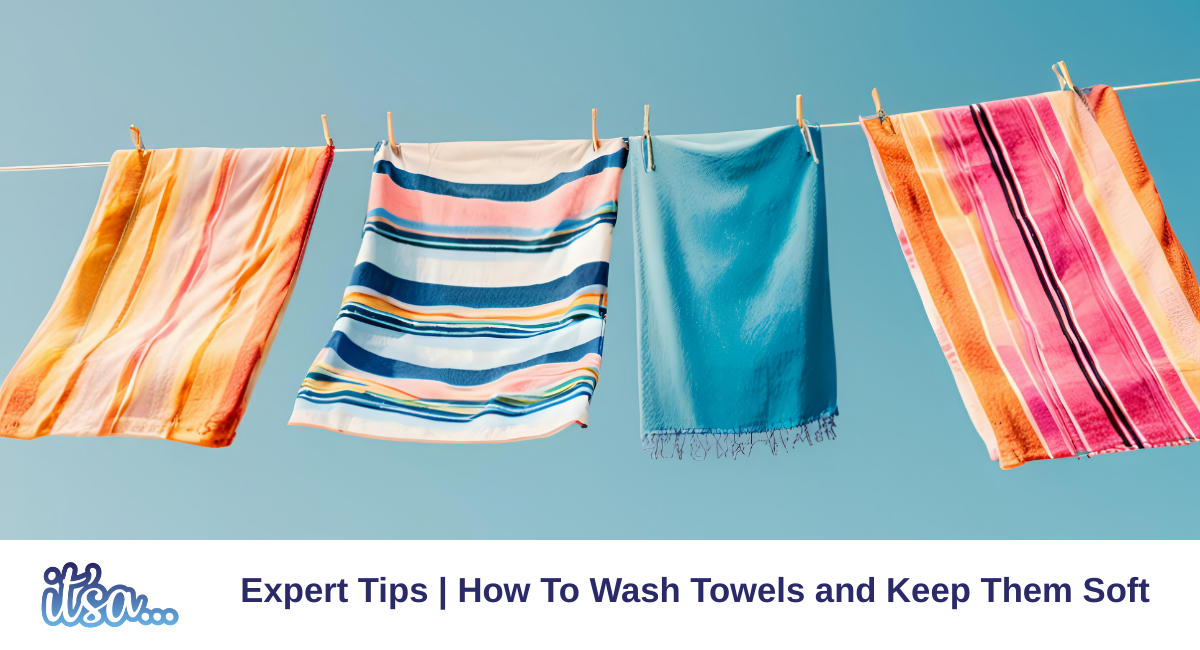How to wash towels and keep them soft and fluffy

There’s nothing quite like the comfort of wrapping yourself in a freshly laundered keep towels fluffy and soft , and luxuriously warm. Yet, over time, even the finest towels can lose that spa-like quality, becoming stiff, scratchy, and less absorbent. This happens when detergent residue, hard water minerals, and frequent washing cause the fabric fibres to clump together, reducing softness and absorbency.
The good news? With the right care routine, you can restore and caring for dry your towels plush feel for years. In this guide, we’ll share proven, easy-to-follow way to wash your towels and keep them soft towel , including natural solutions like cleaning towels with vinegar and baking soda, the best water temperatures to use, and expert tips on how to keep dirty towels without damaging the fabric.
From everyday bath towels to premium towels in UK and delicate beach accessories, you’l learn exactly how to protect and refresh your linens so every dry-off feels like a treat.
Why Towels Lose Softness
If store your towels to keep them soft and fluffy towel as they once did, the problem isn’t always age — it’s often a mix of washing habits, water quality, and fabric fibre damage over time. Understanding why towels lose their softness is key to reversing the problem and preventing it in the future.
Detergent Residue and Fibre Clumping
Using more detergent than necessary doesn’t mean softer towels. In fact, research from fabric care experts shows that excess detergent leaves a sticky residue that clings to fibres, attracting dust and locking in odours. Over time, this residue causes the fibres to clump together, which reduces fluffiness and absorbency.
Pro tip: For a standard 7kg washing machine, you only need around 2 tablespoons (30ml) of liquid detergent — even less if you use a concentrated formula.
Hard Water Mineral Build-Up
According to the UK Water Hardness Survey, over 60% of UK households have hard water, meaning high levels of calcium and magnesium. These minerals bond with the fabric’s fibres, leaving them stiff and rough. This is why towels in hard water areas often lose softness faster than in soft water areas.
Fabric Softener Misuse
While fabric softeners might make towels feel silky at first, repeated use actually coats the fibres in a hydrophobic (water-repelling) layer. This coating traps detergent residue, blocks absorbency, and flattens the loops of terry cloth — making towels look limp instead of plush.
Heat Damage from Over-Drying
High heat is one of the biggest culprits for towel damage. When exposed to tumble dryer temperatures above 60°C, cotton fibres lose moisture too quickly, become brittle, and break more easily. This reduces the towel’s lifespan and makes it feel rough.
Tip: Use a medium heat setting or line dry in sunlight to preserve fabric strength.
Incorrect Water Temperature
While hot water (60°C) is great for killing bacteria and removing heavy oils, using it every wash can weaken cotton fibres. On the flip side, always using cold water can allow build-up to linger. The ideal approach is alternating between warm and hot washes depending on the towel’s level of use.
Compression from Washing Machine Overloading
When towels are crammed into the drum, they can’t move freely. This not only prevents proper cleaning but also compresses fibres, making them less
Rule of thumb: Leave about one-third of the drum empty for airflow and tumbling space.
Skipping the “Shake It Out” Step
A quick shake before drying lifts and separates the loops, which helps them dry evenly and stay fluffy. Many professional laundries make this part of their standard process for premium towels.
How to Wash Towels and Keep Them Soft – Expert Tips
keep towels soft isn’t just about throwing them in the wash — it’s about following the right fabric care techniques that preserve fibre integrity, maintain absorbency, and prevent stiffness.
Here are some effective methods scratchy towel and Keep Them Soft
Wash New Towels Before First Use
New strip towels often contain silicone, fabric softeners, and other finishing agents from manufacturing. These can make them feel soft initially but reduce absorbency. Washing before use removes these coatings and helps fibres open up.
Expert tip: Add half a cup of white vinegar to the first wash to strip away factory finishes and set the dye colour.
Measure Detergent Accurately
Too much detergent causes residue build-up, making towel feel stiff. Too little, and oils remain in the fibres.
Best practice: Use two tablespoons (30ml) of high-quality liquid detergent for a full load, adjusting slightly for towel thickness. Avoid powder detergents in hard water areas unless fully dissolved first.
Use Vinegar and Baking Soda for Natural Softness
-
Fabric softeners: coat fibres, but vinegar and baking soda work naturally:
-
Vinegar rinse: Add a quarter cup of white vinegar during the rinse cycle to dissolve minerals and soften fibres.
-
Baking soda boost: Add two tablespoons to the wash cycle to neutralise odours and refresh fabric.
Alternate Water Temperatures
-
Warm water (40°C) for regular washes keeps fibres clean without causing shrinkage.
-
Hot water (60°C) once every 4–6 washes kills bacteria and removes deep-set oils, especially for gym or beach towels.
Don’t Overload the Washing Machine
Overpacking prevents water and detergent from circulating properly, causing towels to rub and compress. This flattens fibres and reduces fluffiness.
Guideline: Fill the drum about two-thirds full for towels.
Shake Towels Before Drying
often should you wash, give each towel a firm shake. This helps lift the loops, allowing air to circulate and restore volume during drying.
Dry Correctly — Avoid Overheating
-
Excessive tumble dryer heat damages cotton fibres. Instead
-
Use a medium heat setting or tumble dry with dryer balls to prevent clumping.
Line dry in sunlight for natural freshness, then tumble for 5 minutes to fluff.
Deep Clean Monthly
-
Even with good habits, towels benefit from a deep clean every 4–6 weeks:
-
Wash in hot water with one cup of vinegar (no detergent).
-
Second wash with half a cup of baking soda to refresh and deodorise.
Store Towels Properly
Humidity encourages mildew and musty odours. Always make sure towels are made completely dry and folding and store in a cool, ventilated cupboard.
Tips for Long-Term Towel Softness
If you want dry hang caring for your towels to stay soft , and absorbent for a long time, you need more than just the right washing routine. How you use, store, and care for them between washes makes a big difference.
Here are some simple, expert-backed habits to follow:
-
Use More Than One Set: If you keep using the same towel every day, it will wear out quickly. Rotate between two or three sets per person so each towel has time to fully dry and recover its shape.
-
Keep Towels Away from Damp Storage: Storing white towels in a damp bathroom cupboard or a humid room can make them smell musty and feel rough.
-
Store them in a cool, dry place: You can place a small jar of baking soda or a moisture absorber use towels separately on the shelf to keep them fresh and hang your towels
-
Wash Towels on Their Own: Mixing towels together with heavy clothes like jeans or jackets causes friction that flattens the loops and makes them less fluffy. Washing them separately helps protect the fibres.
-
Use Dryer Balls for Extra Fluff: When tumble washing and drying, add wool or rubber dryer sheet balls. They move between the towels, letting air flow better and keeping the fabric soft fluffy without extra chemicals.
-
Skip the Iron: Ironing towels presses down the loops, making them feel flat and thin. If you really need to iron a decorative towel, do it on low heat and on the reverse side.
-
Give Them a Monthly Refresh: Even with good washing habits, towels can build up detergent and mineral residue over time. Once a month, wash them with just a quarter cup of white vinegar — no detergent — to keep them soft and fresh.
-
Treat Hard Water: If you live in an area with hard water, minerals can make towels rough faster. A water softener or a washing machine filter can help protect your fabrics.
-
Start with Quality: Low-quality towels wear out faster no matter how carefully you wash them. For long-lasting softness, choose 100% combed cotton towels or high-GSM towels especially if buying premium towels in the UK or high-quality beach accessories.
Common Mistakes That Make Towels Hard
Even the best towels can turn stiff, scratchy, and rough if you make these common laundry mistakes. Knowing what to avoid is just as important as knowing how to wash them the right way.
Using Too Much Detergent
More detergent doesn’t mean cleaner towels. In fact, it leaves a residue that clings to the fibres, trapping dirt and making towels stiff.
Fix: Use the right amount — about two tablespoons of liquid detergent for a full load.
Adding Fabric Softener Every Wash
Fabric softener might feel nice at first, but it coats the fibres with a waxy layer. This makes towels less and flattens the fluffy loops.
Fix: Use fabric softener sparingly or swap it for vinegar to naturally soft towels.
Washing in Only Cold Water
Cold water is gentle, but it doesn’t always remove oils and residue properly. Over time, this build-up makes towels rough.
Fix: Wash towels in warm water most of the time, with an occasional hot wash to soften deep clean.
Over-Drying on High Heat
Dryers that run too hot can damage cotton fibres, leaving them brittle and scratchy.
Fix: Use a medium heat setting or line dry, then tumble for a few minutes to fluff.
Cramming the Washing Machine
When towels are packed too tightly, they can’t rinse or spin properly. This leaves them heavy, damp, and stiff.
Fix: Fill your washing machine drum two-thirds full for best results.
Not Shaking Towels Before Drying
It sounds small, but shaking towels before drying helps separate the loops and makes them fluffier.
Fix: Give each towel a good shake straight from the washer.
Ignoring Hard Water Build-Up
If you live in a hard water area, minerals like calcium and magnesium can make towels rough quickly.
Fix: Use a quarter cup of white vinegar every few washes to dissolve minerals.
How to Dry Towels for Softness
Drying towels isn’t just about removing moisture — it’s a key step in keeping them soft, fluffy, and long-lasting. Even if you wash towels perfectly, the wrong drying method can undo all your hard work. Here’s how to get it right, based on professional laundry care techniques.
Shake Towels to Loosen Fibres
Right after washing, give each towel a strong shake. This lifts the loops in the terry cloth, helping air circulate better during drying and preventing the fabric from drying in a compressed, flat state. Professional laundries do this as standard because it’s one of the easiest ways to improve fluffiness.
Choose the Correct Heat Setting
High heat might seem efficient, but it can damage cotton fibres, leading to brittleness and reduced softfeel soft and fresh
Medium heat is the sweet spot for most towels, balancing drying time with fibre care.
Low heat is ideal for delicate towels or lightweight, perfect beach accessories.
High heat should only be used occasionally for sanitising purposes, such as after gym use.
Use Dryer Balls or Clean Tennis Balls
Dryer balls (wool, rubber, or even clean tennis balls) bounce between towels, preventing them from clumping together. This improves airflow, speeds up drying, and naturally softens fibres without fabric softener.
Avoid Over-Drying
Over-drying strips too much moisture from the fibres, leaving them brittle and scratchy. Cotton towels, for example, should be removed when they’re just dry to the touch but still slightly warm — they’ll finish drying naturally outside the dryer.
Mix Sun-Drying with Tumble-Drying
-
Sunlight benefits: UV rays naturally disinfect and remove odours.
-
Downside: Towels can feel slightly stiff after line drying.
-
Solution: Dry outside until almost dry, then tumble for 5–10 minutes on low or medium heat to restore softness.
Ensure Proper Ventilation
Whether drying inside or out, airflow is crucial. Poor ventilation traps moisture, creating a damp smell and encouraging mildew growth. Always dry towels in a well-ventilated room or outdoors on breezy days.
Avoid Radiator or Heater Drying
Direct heat from radiators dries towels unevenly, making certain sections stiff. It can also weaken fibres over time. If you must dry indoors in winter, use an airer near — but not on — the heat source.
FAQ About wash towels and keep them soft and fluffy
Is vinegar or baking soda best for washing towels?
Both vinegar and baking soda are excellent for wash towels together, but they work differently. Vinegar dissolves detergent residue and mineral build-up, restoring softness, while baking soda removes odours and refreshes fabric. For best results, use vinegar in the rinse cycle and baking soda in the wash cycle.
How to stop towels from going hard in the wash?
To stop towels from going hard, avoid using too much detergent or fabric softener, as both cause build-up. Wash in warm water, add a quarter cup of vinegar every few washes to dissolve residue, and tumble dry with dryer balls to keep your towels soft.
Do dryer balls keep towels fluffy?
Yes — dryer balls help keep towels soft and fluffy by separating the fibres during drying, allowing better airflow and reducing clumping. They also shorten drying time and soften towels naturally, without the residue left by fabric softeners, making them a great long-term softness solution.
How Often to Wash Your Towels
Bath towels should be washed every three to four uses to prevent bacteria and odour build-up. If you’ve been to the gym, swimming, or the beach, wash them immediately. Regular washing keeps fibres fresh, maintains softness, and helps keep your towels stay fluffy and absorbent longer.
How to Get Smells and Stains Out of Towels
To remove smells and stains from towels, wash them in hot water with a cup of white vinegar (no detergent) to break down odours and residue. Then rewash with half a cup of baking soda to refresh fibres. For stubborn stains, pre-treat with a mild detergent before washing.
Conclusion
Caring for towels isn’t complicated, but it does require the right habits. By washing with the right amount of detergent, using natural softeners like vinegar and baking soda, drying with good airflow, and avoiding common mistakes, you can make your towels last longer whether everyday bath linens, premium towels in the UK, or delicate beach accessories feeling luxuriously soft and fluffy for a long time.
-
Posted in
beach accessories, beach towel, beach towel in uk












